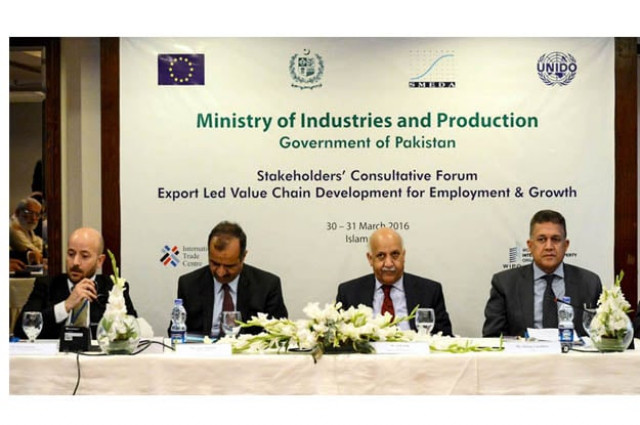Horticulture, light engineering have big potential to create jobs
Experts recommend focus on these areas for promoting national exports

Industries and Production Secretary Muhammad Arif Azim at Consultative Forum Export-led value Chain Development for Employments and Growth in the country. PHOTO: NNI
They were speaking at a two-day consultative forum that opened on Wednesday with the cooperation of the Small and Medium Enterprises Development Authority (Smeda).
The dialogue held under the auspices of the European Union-funded Trade Related Technical Assistance (TRTA-II) programme, implemented by the United Nations Industrial Development Organisation (Unido), would help compile recommendations for the export-led development of employment and growth.

The forum will prepare a concept note and strategic paper on key areas of intervention in specific sectors, which may be used as a template for developing project documents that the government can use to mobilise national and international funds.
After inaugurating the dialogue, Industries and Production Secretary Muhammad Arif Azim said it was important to discuss the gaps and issues in these sectors so that necessary steps could be taken to tackle them.
EU representative to Pakistan Johan Sorensen appreciated efforts of all the partners and outlined the impact these would have if the economic issues were resolved effectively.
Unido representative Esam Alqararah shared the UN body’s vision on export-led development and the efforts it was making to promote employment and growth in Pakistan. The main focus of the forum was to highlight key achievements of the TRTA programme since 2004 as it was approaching its end in May 2016, what areas related to employment generation and pro-poor and rural development may be focused to build on the TRTA success. These interventions will be in line with the government’s Vision 2025.
Smeda CEO Muhammad Alamgir Chaudhry gave a presentation on the authority’s sector-specific studies, which was followed by overviews on the Vision 2025 and TRTA achievements.
The speakers were of the unanimous view that export-focused sectors of small and medium industries should be provided necessary support to fill in the gap in production and marketing.
They acknowledged that the 13 sectors identified by Smeda for generating new space for exports and employment could play a pivotal role in increasing national exports and creating job opportunities.
They recommended the application of Smeda’s SME development strategy designed to generate 10 million new jobs with an addition of $36 million to the country’s exports within five years.
Most of the speakers agreed on the cluster-based development approach of Smeda to promote economic development by improving competitiveness of the designated sectors. These include logistics, information and communication technology and allied services, gems and jewellery, horticulture, construction, fisheries, energy, dairy, livestock and engineering.
The forum called for making the SME sector more competitive through provision of common facilities, training centres and benefits of clusters by resolving issues to be faced in financing and marketing.
Published in The Express Tribune, March 31st, 2016.
Like Business on Facebook, follow @TribuneBiz on Twitter to stay informed and join in the conversation.



1733130350-0/Untitled-design-(76)1733130350-0-208x130.webp)















COMMENTS
Comments are moderated and generally will be posted if they are on-topic and not abusive.
For more information, please see our Comments FAQ